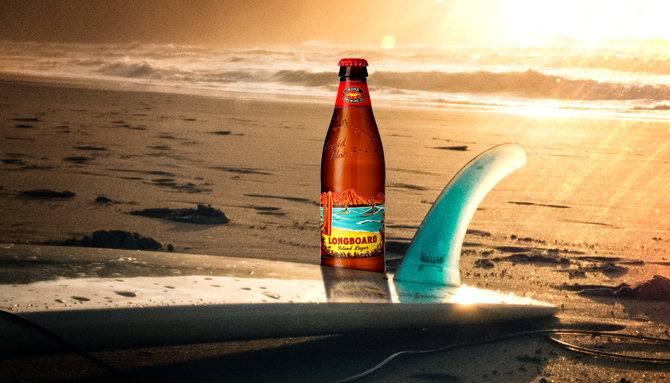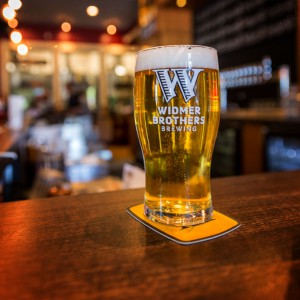
During a call with investors and analysts on Thursday, Craft Brew Alliance CEO Andy Thomas characterized the company’s second quarter results as “another win,” even though company-wide depletions dipped 2 percent amidst pressure from more than 5,500 breweries competing for an evolving consumer set that Thomas called “alien.”
Nevertheless, Thomas argued that CBA’s continued focus on providing high quality brands — coupled with its innovation efforts, healthy pricing, efficient brewery and supply chain operations and ‘deft management of funds’ — puts the company in a position to succeed over the long term, even as it probes for new ways to appeal to increasingly more promiscuous drinkers.
As Brewbound reported yesterday, depletions for CBA’s lead brand, Kona, increased 9 percent during the second quarter. Through the first six months of the year, Kona depletions grew by 11 percent, Thomas added. That growth is driven by flagship Big Wave Golden Ale, depletions for which have increased 24 percent year-to-date.
“We continue to believe that our Kona plus strategy is built for this evolving market,” Thomas said during the call.

However, Kona’s continued growth couldn’t offset ongoing declines of the Widmer Brothers and Redhook brands, whose sales to retailers declined 13 and 24 percent, respectively, in Q2.
In order to stem the bleeding of the Widmer Brothers brand, CBA ceased distribution of the brewery’s beer in 35 states, as of April 1, retreating to its home market of Portland, Ore.
“We really are picking our battles,” Thomas said. “With more targeted geographies, we feel the volumes in the back half of the year are more defendable and more defensible based on the headwinds. With those volumes being more defensible, we’ll have better traction on the pricing front.”
Thomas added that the company’s partnerships with Appalachian Mountain Brewery, Cisco Brewers and Wynwood Brewing are also helping CBA be more relevant in local markets.
But the success of those arrangements, which make up the smallest portion of total CBA shipment volumes, wasn’t enough to push the company past headwinds in its largest markets of California, Oregon and Washington.
CMO Ken Kunze said CBA has faced challenges in those states, noting that the craft segment “posted some of the slowest growth figures in the first half of 2017.” Citing Nielsen data through July 1, Kunze said craft volumes in “California were down 4.7 percent, Oregon down 3.8 percent and Washington down 3.3 percent.”
However, Kunze added that CBA has maintained its share of total beer on the year and increased share in some key markets. Kona’s share of craft grew by 250 basis points in Hawaii and 80 bps in Florida. The brand lost 10 bps of share in California, however, which Kunze called the “only significant underperformance” during the first half of the year.
In an effort to reverse the downward Kona trends in California, CBA is planning to rollout a media campaign in Los Angeles.
In Oregon, meanwhile, Widmer grew share by 100 bps, Kunze added.
For its partner brands, Appalachian Mountain Brewery grew share by 50 bps in North Carolina, while growing depletions 50 percent through the first half of the year.
And in New England, Cisco Brewers grew share by 170 bps, while increasing depletions 8.4 percent in Q2, and Kunze said the company has taken a number of steps “to better align this brand in A-B wholesaler network in Q2.”
A distributor realignment “should result in improved execution moving forward,” Kunze said.
“We are expanding distribution both in geographical type of account, which should help address Cisco’s current seasonality over time,” he said.

However, Redhook lost 100 bps of share in its home state of Washington.
“While more work is needed, we’re seeing positive traction behind new beers like Big Ballard Imperial IPA and Bicoastal IPA,” Kunze said. The company is also banking on the opening of the new Redhook Brewlab in Seattle to help turnaround the ailing brand’s fortunes.
Year-to-date, however, sales at CBA’s five brewpubs are down 4.4 percent. Kunze blamed the declines on slower foot traffic due to weather-related closures, difficult restaurant trends and the increasing number of craft brewpub options.
Globally, CBA shipment volumes increased 19 percent in Q2 via its partnership with Craft Can Travel, and Kunze said further international expansion is being planned through its partnership with ABI.
“We remain optimistic on the international opportunity for Kona,” Kunze said.
Also during the quarter, CBA ended its contract brewing agreement with City Brewing in Memphis, Tenn., and ceased brewing operations at its production facility in Woodinville, Wash., as Brewbound previously reported.
The company also began making beer at Anheuser-Busch InBev’s Fort Collins brewing facility, where CBA is capable of producing up to 300,000 barrels annually. The company plans to ship 150,000 barrels from that facility this year and realize about $1.5 million in 2017 cost savings as a result of shifting production.
CBA also said it would proceed with a previously announced 100,000 barrel brewery project in Kona, despite delays. Construction is expected to commence in 2018 and executives said the facility would be operations during the first quarter of 2019.
Wall Street responded favorably to CBA’s Q2 results as shares of BREW, which opened at $16.90, shot as high as $18.20 in early morning trading. The stock finished the day up just over 1.4 percent, at $17.30 per share.
In a report following the call, Cowen & Co. analyst Vivien Azer said she remained “constructive on Kona’s growth trajectory and the turnaround on Widmer Brothers despite challenges in California and the broader U.S. beer industry.”